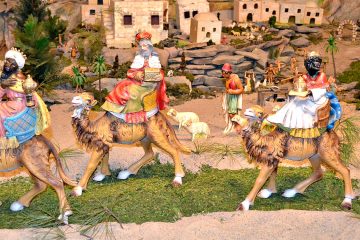Sunday Scripture: Our Lord Jesus Christ, King of the universe
By Sister Betty Jane Lillie, SC
Thirty-Fourth or Last Sunday of Ordinary Time: Daniel 7:13-14; Psalm 93:1-2, 5; Revelation 1:5-8; John 18:33b-37
This glorious feast that is the crown of the liturgical year calls our attention to the ultimate sovereignty of Jesus Christ. Our Gospel passage gives us the focus for our consideration and roots our discussion in the concept of Jesus as the king of truth. In His trial before Pilate, Pilate did not wait for the answer to his own question, “What is truth?”
He acknowledged that there was no crime in Jesus, but then referred to Him as King of the Jews (John 18:38-39). Jesus’ own description of His kingship was that His kingship was not of this world. That statement in itself would have been puzzling to those whose afterlife concept did not include a kingdom in another world.
The recognition of Pilate, “So you are a king?” was answered by Jesus, “You have said it!” But only those who were of the truth would be able to accept it. Faith attests to Jesus’ Lordship, and faith’s assent is integral to the heart of the Christian life.
In the Gospel narrative it will come to full realization after the resurrection. A well known scholar once said that Catholics are a resurrection people. hat is certainly true, and if we pause for a moment and reflect on the post-resurrection appearances that come in the two final chapters of John’s Gospel, we will realize that after the darkness of the death of Jesus, the light of resurrection glory began to dawn on his followers. For instance, Mary Magdalen as the “apostle of the resurrection” announced to the disciples that she had seen the Lord (John 20:18). And later we see Peter’s threefold avowal of his love for Jesus, and Jesus telling Peter to follow Him (John 21:22).
Now to look back to our first reading, we see its resonance in the vision of Daniel with the son of man who came to God and received glory and kingdom, and everlasting dominion which would not pass away. The son of man is a reference to the messianic king. As in apocalyptic writings in general, an angel gave an interpretation of those events. The events deal with the historical situation of that period in history, but in our readings in our time we see a similarity to the messianic nature of the dominion of Jesus.
Our second reading is short, but it sums up for us the essence of what this feast is about. Jesus Christ is referred to as the faithful witness, the first-born of the dead and the ruler of kings on the earth. “To Him who loves us and has freed us from our sins by His blood and made us a kingdom, priests to His God and Father, to Him be glory and dominion for ever and ever. Amen” (Revelation 1:5-6). “I am the Alpha and the Omega, says the Lord God, who is and who was and who is to come, the Almighty (Revelation 1:8).
With the psalmist we can sing, “The Lord reigns; He is robed in majesty; the Lord is robed, He is girded with strength.” He is from everlasting (Psalm 93).
Sister Betty Jane is a faculty member at the Athenaeum of Ohio.













